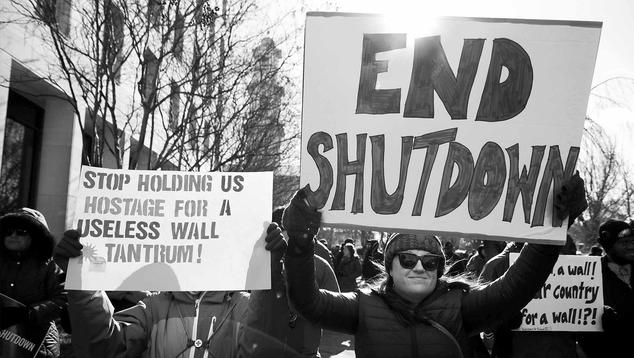The U.S. government is partially shut down because elected representatives and the elected president can't agree on legislation to fund government operations. This comes at a time when the people of the United States have in all but two of the past 13 months named dysfunctional government as the top problem facing the nation. This month, 29% of Americans say government is the most important problem, tied for the highest since the last government shutdown in 2013.
At the same time, in all but one of the past 13 months, Americans have named immigration as either the second most important problem facing the nation or, when government was not on top, the most important problem. Some 21% this month say immigration is the nation's biggest problem, second behind government.
This is relevant, of course, because a dispute over an immigration-related issue -- building a wall on the U.S.-Mexico border -- is causing the government shutdown. What the public perceives as the two top problems facing the nation -- dysfunctional government and immigration -- are thus yoked together, with the failure of government leaders to address the latter reinforcing the public's worry about the former.
We don't have a lot of polling data on the importance of the wall as an issue to Americans. But we do have data showing that the idea of building a border wall between the U.S. and Mexico is supported by well less than a majority of Americans. This finding has been confirmed by a number of different polling organizations, including our Gallup research and recent surveys conducted by Quinnipiac, CNN, ABC-Washington Post, Pew and others. The shutdown is being driven by the failure of elected leaders to deal with a policy proposal that a majority of Americans oppose.
The idea of building a wall has become what I call an "RPPI" -- a Rigidly Partisan Policy Issue. That's an issue on which views are highly entrenched and largely based on underlying partisan identity.
When Gallup last asked about the wall, 73% of Republicans supported "significantly expanding the construction of walls along the U.S.-Mexico border," compared with 13% of Democrats saying the same. The latest Quinnipiac poll shows a larger divide in response to slightly different wording: 88% of Republicans favor "building a wall along the border with Mexico," compared with 6% of Democrats. Pew's latest poll shows similar results -- 82% of Republicans and 6% of Democrats in favor. Pew analysts noted that "partisan differences [on the wall] are now wider than they have ever been."
Many Americans probably hadn't thought much about a wall prior to the Trump presidential campaign. When Trump adopted the wall as a central theme of his campaign, Americans presumably took cues on where they stand on the issue based on his position. Americans who supported Trump supported the wall. Americans who didn't support Trump didn't support the wall.
Trump has said he could shoot someone on Fifth Avenue and wouldn't lose the support of his base. Similarly, he is very unlikely to lose support for the wall among his base, regardless of what he does. It also follows that Trump is unlikely to gain support for his wall among those not in his base, regardless of what he does.
My colleague Jeff Jones has confirmed that Americans' views of President Trump are more partisan than they have been for any U.S. president in history. Americans' views of the wall are ending up just as rigidly partisan and invariant as their views of the president.
This doesn't mean that Trump -- and Democrats -- have not been trying to change public opinion. Trump has used Twitter, comments to reporters in ad hoc press conferences and his Jan. 8 prime-time speech to the nation from the Oval Office to argue his case. Democratic leaders, who aren't much more popular than Trump, have for their part attempted to show why the wall is not necessary and not a high priority. For the reasons I've outlined, there is little evidence that any of this has worked. The probability that public opinion on the wall is going to change substantially is low.
Ordinarily, a failure to shift attitudes would mean backing down and looking for other ways to gather support. Shutting down the government to change minds is one such tactic. This comes, however, not only with the human costs involved when government doesn't function and people are thrown out of work, but also with the cost of exacerbating Americans' concerns about the way their government functions -- already in their view the most important problem facing the nation today. Regardless, it doesn't appear likely that any tactic at this point is going to change many Americans' minds about building the wall, while their views of government can only get worse.




